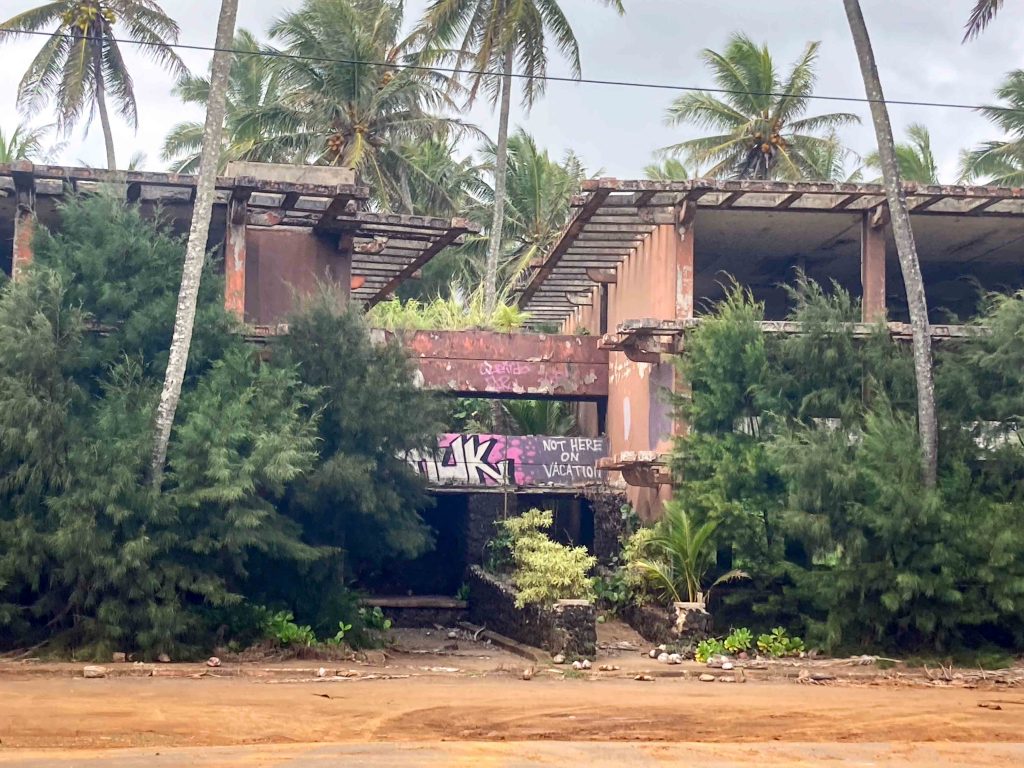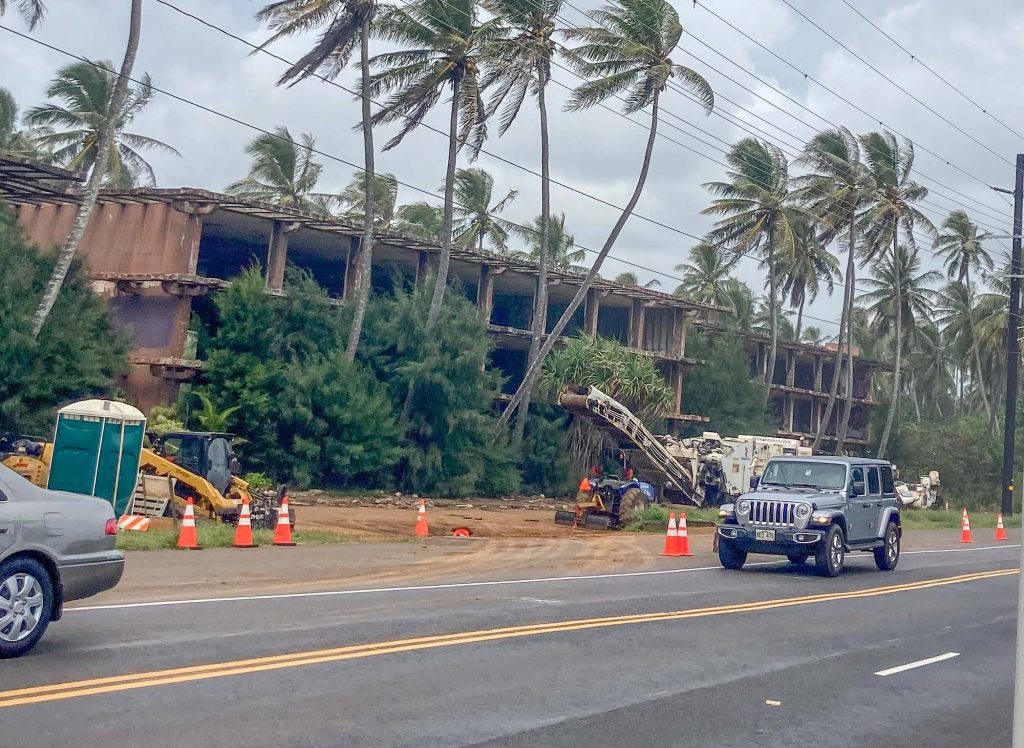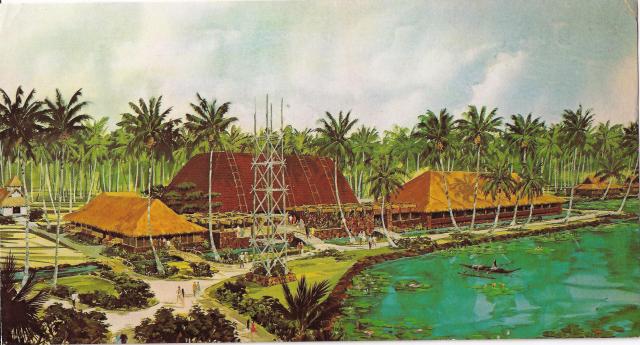Deprecated: stripslashes(): Passing null to parameter #1 ($string) of type string is deprecated in /mnt/efs/html/wp-content/plugins/template-scripts/src/AuthorBios/Frontend.php on line 129
Kauaʻi community group trying to buy Coco Palms from Utah owners planning 350-room hotel
The current Utah-based owners of the once iconic Coco Palms Resort in Wailuā plan to build a new 350-room hotel on the site that once hosted A-list celebrities and the film production of Elvis Presleyʻs 1961 musical “Blue Hawai‘i.”
But many in the local community have had enough of out-of-town developers from the mainland who don’t deliver and who don’t appreciate the sacredness of the land.
“If (developers) felt anywhere close to the way our community feels about the property, they would have done something a long time ago,” said former state senate majority leader Gary Hooser. “But it’s sat like a rubbish heap now for 30 years.”
Hooser is a member of the Kaua’i community group, I Ola Wailuanui, which has launched a grassroots fundraising campaign to purchase the derelict resort that has been in ruins since Hurricane Iniki destroyed it in 1992.
Last week, I Ola Wailuanui garnered $200,000 in pledged donations, a fraction of what it will need, but a start.
The effort is the latest example of opposition to the current developer’s construction plans. Last month, news outlets reported that hundreds of community members testified against the planned hotel at Coco Palms during meetings of the county planning commission and the state Board of Land and Natural Resources. And nearly 14,000 people have signed an online petition opposing hotel construction.
If I Ola Wailuanui was able to acquire Coco Palms, its plan is to demolish what is left of the old resort and build a Hawaiian cultural and educational center.
“This property is incredibly important to history and culture,” Hooser said. “It’s literally the birthplace of Hawaiian royalty.”
The significance of the old resort goes far beyond the glamour of old Hollywood. It is home to ancient heiau (temples), loko i‘a (fishponds) and iwi kupuna (ancestral remains).
Author Edward Joesting, in his classic history “Kaua‘i: The Separate Kingdom,” wrote:
“It had been chosen as the capital by kings and was home of the high chiefs of Kaua‘i. Together with Waialua, on O‘ahu, it was considered to be one of the two most sacred areas in all the Islands.”
I Ola Wailuanui’s membership includes local attorneys, historians, cultural practitioners, community organizers and politicians, including county councilmember Mason Chock, who grew up near Coco Palms Resort in the 1970s. At that time, Chock’s father was the hotel’s executive chef, and he remembers the resort as his childhood backyard and playground.
However, Chock does not want to see another hotel occupy this sacred space. Like Hooser, he cites decades of failed rebuilding attempts and the area’s well-established cultural and historical importance.
Chock also said another hotel is not needed on an island already saturated by tourism: “The (2018 Kauai) General Plan said we‘re over capacity. The Executive Director of the Visitor’s Bureau says we’re over capacity.
“When we’re sitting in traffic right in this corridor, when we recognize that this thing is falling apart before our very eyes and it’s not being respected at all … What we really should do is rethink how this can serve us in a better way.”
Coco Palms, originally built in the 1950s, was last sold at a foreclosure auction in July 2021 for $22 million to the only bidder, Stillwater Equity Partners. I Ola Wailuanui is using that figure to ballpark the funds needed to acquire the property from its current owners, an undisclosed group of Utah-based buyers called RP21 Coco Palms LLC, which have publicly signaled a willingness to entertain offers.
An estimated total price tag of $53.4 million or less would be needed to acquire, demolish, plan, restore and steward the land as a cultural and educational center, according to I Ola Wailuanui representatives.
Suggested aspects of the proposed center include agricultural restoration and local food production, a museum, a musical amphitheater, a hula mound and canoe hale.
With $200,000 already pledged by small donors, I Ola Wailuanui’s acting executive director Fern Anuenue Holland now hopes to bring the group’s plans before wealthy potential donors.
“We’re really looking for those larger anchor donors: people that could donate $1 million to $5 million to be an anchor donor and show that we have that weight behind us,” said Holland, who is currently running for County Council.
Hooser, Chock and Holland agree it’s a tall order. Yet they believe it can be done.
“It sounds like a dream to a lot of people: ‘How are we going to create this and come up with all this money?’ And it’s true, it’s the largest capital project I think most of us have ever worked on,” Holland said. “But we truly believe the site would be way better served as a place of cultural enrichment, of agricultural restoration, and of connection for the Hawaiian people.
“When there’s a will this strong to return what is arguably one of the most significant Hawaiian cultural sites in all of the Islands back to the Hawaiian people in a way that serves an entire community … I think people that have the capacity will come to the table when they see how amazing this vision is.”
Sponsored Content
Notice: Function the_widget was called incorrectly. Widgets need to be registered using
register_widget(), before they can be displayed. Please see Debugging in WordPress for more information. (This message was added in version 4.9.0.) in /mnt/efs/html/wp-includes/functions.php on line 6114
















